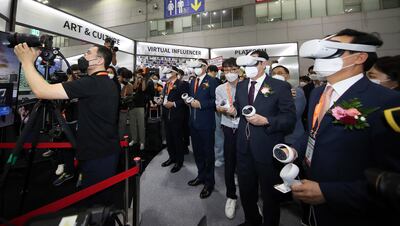Facebook launched a $50 million fund to “responsibly” build a metaverse – a digital space that allows users to communicate and move virtually.
The XR Programmes and Research Fund will invest in programmes and external research over the course of two years, the company said.
The social networking giant will through the fund collaborate with industry partners, civil rights groups, governments, non-profits and academic institutions to determine how to build metaverse technologies responsibly, it said.
“The metaverse won’t be built overnight by a single company … we develop technology rooted in human connection that brings people together,” Facebook’s vice president of reality labs Andrew Bosworth and vice president of global affairs Nick Clegg said.
“As we focus on helping to build the next computing platform, our work across augmented and virtual reality and consumer hardware will deepen that human connection regardless of physical distance and without being tied to devices,” they added.
The metaverse is a set of spaces where users can innovate and engage other people who are not in the same physical space.
It might take 10 to 15 years to fully realise the metaverse products, said the company, adding that its success depends on building robust interoperability across services to ensure different companies’ experiences can work together.

“We also need to involve the human rights and civil rights communities from the start to ensure these technologies are built in a way that’s inclusive and empowering,” said Mr Bosworth and Mr Clegg.
Facebook is focusing on economic opportunity, privacy, safety, integrity, equity and inclusion to anticipate the potential risks before metaverse is introduced.
Over the years, Facebook has invested heavily in its reality labs division. Nearly 20 per cent, or 10,000 people, of Facebook’s total team is employed at these labs, up from about 5 per cent in 2017, according to the US publication The Information.
Earlier this month, the company also launched its first smart glasses – Ray-Ban Stories – that let users capture photos, record videos, listen to music, podcasts and take phone calls without involving their smartphone.
Exploring new technologies such as artificial intelligence and augmented reality will help Facebook to diversify its portfolio and add to it its sales, industry experts said.
“About every decade we believe companies need to reinvent themselves to address large new markets and satisfy investors for the long term. For a company the size of Facebook, with an expected $150 billion in revenue next year, maintaining growth requires a massive, greenfield opportunity,” the US venture capital company Loup Ventures said in a note to clients.
“We believe the metaverse is a sufficiently large opportunity for a company the size of Facebook to chase. Despite the recent hype the metaverse remains Facebook’s most potent and underappreciated innovation opportunity.”


